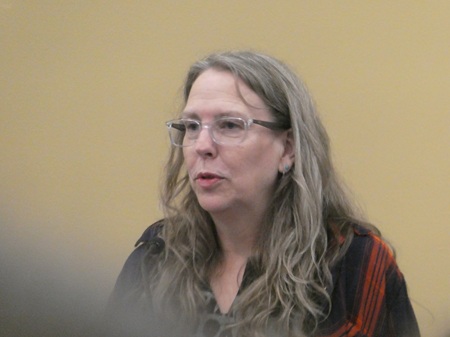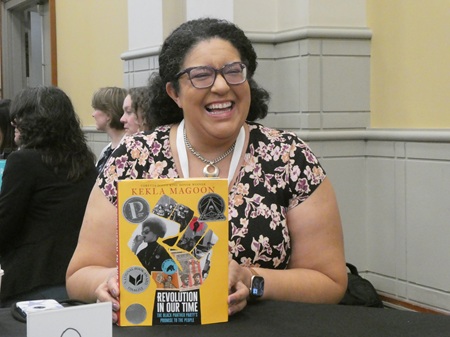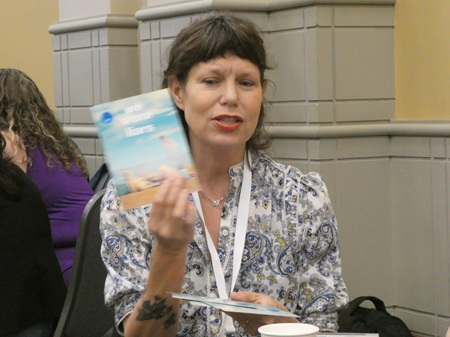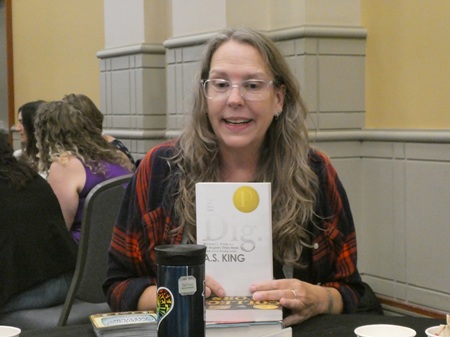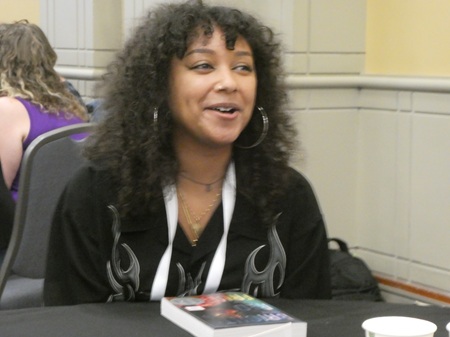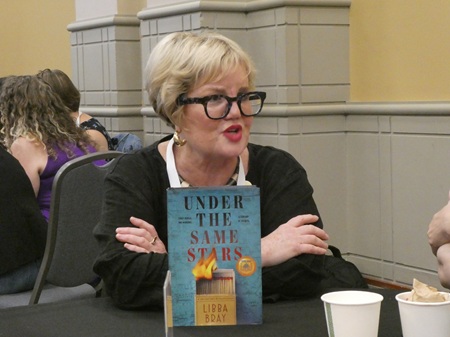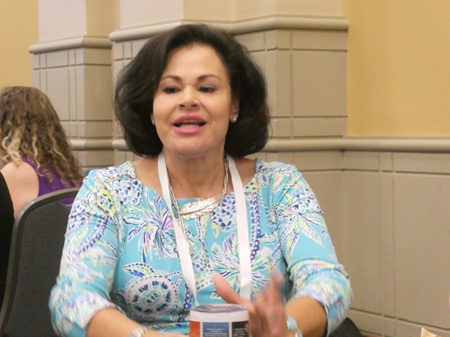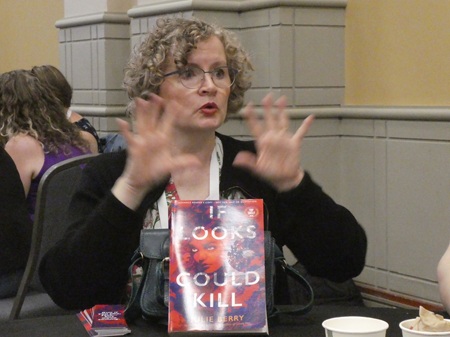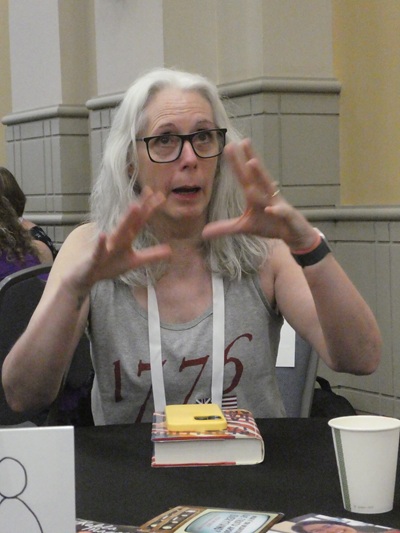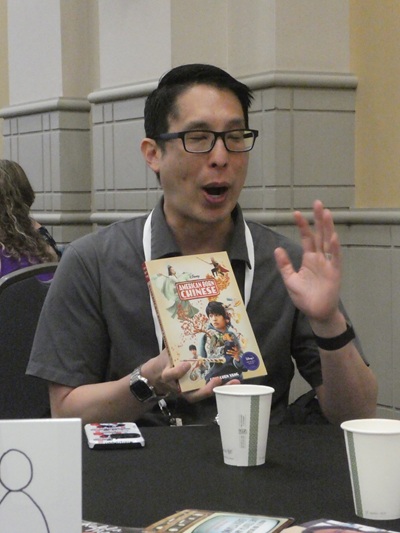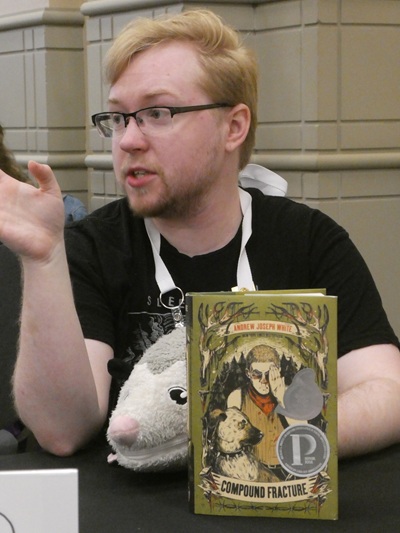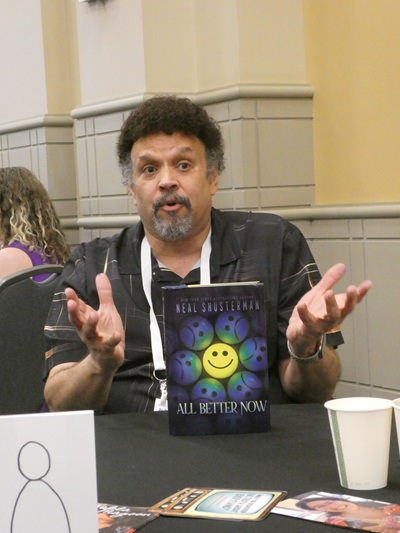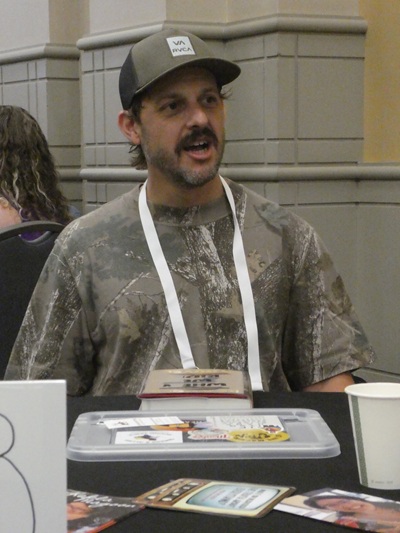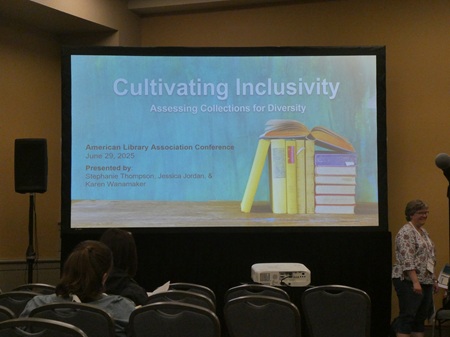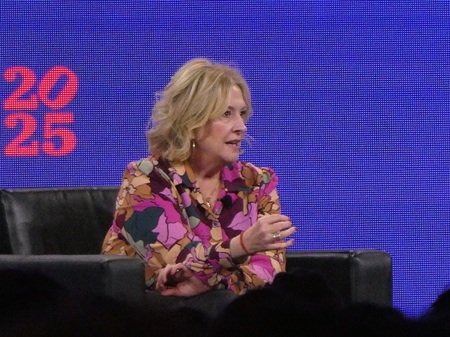I started out the third day of the American Library Association at the YA Author Coffee Klatch – a sort of speed dating with authors. There were 13 authors there, and 13 tables. Each author spent 5 minutes at each table talking with us about their books. In honor of the 25th anniversary of the Printz Award, all the authors invited this year had some time received the Printz Award or Printz Honor.
First, there was a short keynote from A. S. King (above).
She won last year for editing the short story collection, The Collectors, and she won in 2020 for her novel Dig..
The Printz Award keeps changing her life. It keeps passing on love and truth to young people. It expands her voice. It respects young people and their lives and truth.
We (authors and librarians) are doing the best and most bad-ass work on earth.
Kekla Magoon, author of Revolution In Our Time: The Black Panther Party’s Promise to the People, was the first author at our table.
The first publisher who accepted this book wanted it smaller and simpler. But it’s a complex story. The Civil Rights Movement staying committed to peace no matter what happened was a huge act. Folks got fed up after a decade. Young people rose up to take care of themselves.
Then came E. Lockhart, who won Printz Honor with The Disreputable History of Frankie Landau-Banks. She’s now most known for her book We Were Liars and its sequels. She’s got a new one coming out in November from that world. It’s not a prequel or a sequel, but is beachy gothic. It’s called We Fell Apart. [I need to read those books – they’re wildly popular at the library.]
A. S. King was at our table next. Her Printz winner Dig is about whiteness and how it trickles down.
Her new book is called Pick the Lock. The father is a symbol of white supremacy, and the daughter (the protagonist) is writing an opera called “Free Mother.” Her mother is a prisoner in pneumatic tubes in the house. [Yes, A. S. King always writes wonderfully weird fiction.]
Safia Elhillo came next, author of one of this year’s Honor Books, Bright Red Fruit.
This was her second book. Her first book, she made everything up, but this book is about her own Sudanese community.
Then came Libba Bray, who won the award for Going Bovine in 2010. She talked about her new book, Under the Same Stars. This book came about because she read about the Bridegroom Oak, a matchmaking tree in Germany – and thought murder. But it’s a historical novel set in three time periods – all about rising up and protesting.
Angeline Boulley spoke to us next. Her first book, Firekeeper’s Daughter, won the Printz Award in 2022. Very soon her third book is coming out, Sisters in the Wind. Location is another character in her books. This new one happens in the time in between the other two. If you’re doing a book club with her book, check her website angelineboulley.com for a free appearance!
Julie Berry won Printz Honor in 2017 with a book I just love, The Passion of Dolssa. I was super excited to hear about her new book, coming out in September, If Looks Could Kill. It’s deeply researched historical fiction (as so many of her books are) – about Medusa vs. Jack the Ripper in lower east side Manhattan. It asks, “What do I actually believe about mercy and justice?” At its heart, it’s a friendship story. [I was bummed they were out of Advance Reader Copies when I rushed to the Simon & Schuster booth.]
Then Laurie Halse Anderson, who won Printz Honor for Speak back in 2001, told us about her new book, Rebellion: 1776. She mentioned how the book bans have impacted her work – she did one school visit last year – she used to do many each month. She said that she can handle it, because she’s well-established, but urged us to do what we can to support new authors coming up because they need those school visits. For her new book, she looked at the Adams family correspondence during the Revolutionary War, which has been digitized. In Boston, families were divided about the Revolution.
Gene Luen Yang won the Printz Award in 2007 for American Born Chinese. He was teaching high school full-time when he got the call, and didn’t realize how life-changing it would be.
Andrew Joseph White is one of this year’s Honor Book authors for Compound Fracture. He told us he has an adult book coming out, about how true crime is bad. (Intriguing!) He will have a Stone Age fantasy in 2026.
Neal Shusterman won Printz Honor in 2017 for Scythe. First he told us about his new book, All Better Now and a pandemic that causes happiness – but all the people who have a vested interest in creating a vaccine for happiness. It’s going to be a duology [Yay!], with the conclusion to be titled All Over Now. But he won’t be writing that right away, because he’s currently writing a prequel to Scythe called Rising Thunder that will be out in Fall 2026. I can hardly wait!
Rex Ogle is the author of this year’s Honor Book, Road Home. Unlike Road Home, his new book, When We Ride, is only 70% true. He wrote it for his best friend in high school, Marshall, who took care of his family by drug dealing. You can go through hard things and do good things. He wrote it in verse, because Marshall would only read a book if it had lots of white space.
Oops! Somehow I forgot to take a picture of Daniel Nayeri, 2021 Printz Winner for Everything Sad Is Untrue. He has a soft spot for libraries, because his first job, ages 12 to 18, was a library page. He started writing by ghost writing people’s memoirs, which is a strange genre. How do you tell the truth when it’s embarrassing? That directly led to Everything Sad Is Untrue.
After the YA Coffee Klatch, I went to some meetings for librarians in Collection Management. Those weren’t so much about taking notes as about meeting other librarians in the field. The first was for children’s collections, and the second for public library collections.
I also spent some time in the exhibits, leaving the meeting early to make sure I got an Advance Reader Copy of Hannah V. Sawyerr’s new book, Truth Is. I’m excited about it! When I was on the 2024 Morris Award committee, we selected her debut book, All the Fighting Parts, as one of our Fi nalists. As soon as Hannah saw me in line, she gave me a hug! One of the best parts of being on award committees is getting to touch authors’ lives in a super positive way!
Then I went to a session called: “Cultivating Inclusivity: Assessing Collections for Diversity”
Yes, libraries still want our collections to match the diversity of our populations and for folks to feel included. This turned out to be mostly an academic library viewpoint, so I didn’t stay for the whole thing, but they did have some good resources about evaluating your collections and referred to a document from ALA called “Diverse Collections: An Interpretation of the Library Bill of Rights.”
I finished up the main part of the day attending the Main Stage presentation with Brené Brown.
First, she talked about how much she loves librarians. “If they’re coming for you, they have to frickin’ go through us!”
Then she talked about studying vulnerability. She had the first qualitative dissertation at her school. She kept finding a link to shame and a deep feeling of disconnection. She was told that the decision to study shame has been the death of many academic careers.
Vulnerability is not weakness – it’s the only path to courage.
Democracy is an amazing experiment, and it depends on education and virtue. The two were separated early on because you can have one without the other.
A world without the freedom to read is a direct threat to democracy – and she’s quite sure that’s the plan.
No science, no research, no books = No democracy
Asked what it takes to be a daring leader, she said that “executive presence” is code for – do you look like someone who’s a leader in an 80s movie. Now she talks about “pocket presence” – based on a quarterback who has about 3 seconds in the “pocket” to decide the play. It requires such qualities as situational awareness, anticipatory thinking, and strategic thinking. This is what it will take to protect our democracy.
Daring leadership is more interested in getting something right than being right. And has the humility of power with, to, and within (but not over).
In order to maintain power over people, you have to demonstrate cruelty. Because fear has a short shelf life.
We need to be learners, not knowers.
You can’t give what you don’t have, so find some awe, wonder, and joy in your life.
Limit your intake – overwhelm is part of the plan. Get small and local in making a difference.
The antidote to despair is hope. Hope is a cognitive behavioral process: I can have a goal. I can make a plan (with many back-ups). I believe in my ability to effect change. Goals too big lead to despair. Recognize small achievements! Small wins matter.
Her new book is a spiritual response to Dare to Lead.
Be awkward. Be brave. Be kind. The opposite of courage is armor.
When we’re “under the line,” we act as hero, victim, or villain. “Over the line,” we can be Coach, challenger, creator.
